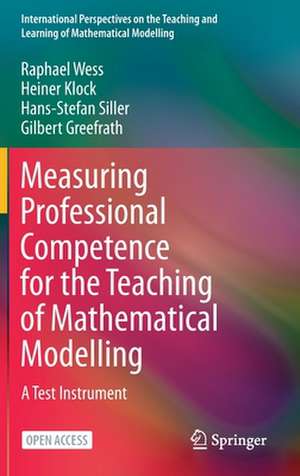Measuring Professional Competence for the Teaching of Mathematical Modelling: A Test Instrument: International Perspectives on the Teaching and Learning of Mathematical Modelling
Autor Raphael Wess, Heiner Klock, Hans-Stefan Siller, Gilbert Greefrathen Limba Engleză Hardback – 15 iul 2021
Teaching mathematical modelling is a cognitively challenging activity for (prospective) teachers. Thus, teacher education requires a detailed analysis of professional competence for teaching mathematical modelling. Measuring this competence requires theoretical models thataccurately describe requirements placed upon teachers, as well as appropriate evaluation tools that adequately capture skills and abilities in this field. This book presents an instrument that measures the professional competences in a sample of 349 prospective teachers.
| Toate formatele și edițiile | Preț | Express |
|---|---|---|
| Paperback (1) | 345.89 lei 6-8 săpt. | |
| Springer International Publishing – 16 iul 2022 | 345.89 lei 6-8 săpt. | |
| Hardback (1) | 227.77 lei 3-5 săpt. | +21.76 lei 6-12 zile |
| Springer International Publishing – 15 iul 2021 | 227.77 lei 3-5 săpt. | +21.76 lei 6-12 zile |
Preț: 227.77 lei
Nou
Puncte Express: 342
Preț estimativ în valută:
43.59€ • 46.61$ • 36.34£
43.59€ • 46.61$ • 36.34£
Carte disponibilă
Livrare economică 28 martie-11 aprilie
Livrare express 13-19 martie pentru 31.75 lei
Preluare comenzi: 021 569.72.76
Specificații
ISBN-13: 9783030780708
ISBN-10: 3030780708
Pagini: 129
Ilustrații: X, 129 p. 93 illus., 18 illus. in color.
Dimensiuni: 155 x 235 x 15 mm
Greutate: 0.38 kg
Ediția:1st ed. 2021
Editura: Springer International Publishing
Colecția Springer
Seria International Perspectives on the Teaching and Learning of Mathematical Modelling
Locul publicării:Cham, Switzerland
ISBN-10: 3030780708
Pagini: 129
Ilustrații: X, 129 p. 93 illus., 18 illus. in color.
Dimensiuni: 155 x 235 x 15 mm
Greutate: 0.38 kg
Ediția:1st ed. 2021
Editura: Springer International Publishing
Colecția Springer
Seria International Perspectives on the Teaching and Learning of Mathematical Modelling
Locul publicării:Cham, Switzerland
Cuprins
Introduction.- Objectives and application areas.- Test development.- Implementation of the test.- Test quality.- Selected results.- References.- Attachment.- Modelling experiences.- Beliefs about mathematical modelling.- Self-efficacy about assesing mathematical modelling.- Modelling specific pedagogical content knowledge.- Test booklet.
Notă biografică
Raphael Wess received his doctorate on Professional Competence for Teaching Mathematical Modelling as a research assistant at the Institute for Mathematics Education and Computer Science Education at the University of Münster.
Heiner Klock worked as a research assistant at the Department of Mathematics (Mathematics Education) at the University of Koblenz-Landau and received his doctorate at the University of Würzburg on Adaptive Intervention Competence in Mathematical Modelling Processes.
Prof. Dr. Hans-Stefan Siller is Professor of Mathematics Education and holds the Chair for Mathematics V at the Julius Maximilians University in Würzburg. His research focuses on mathematical modeling, reality-related mathematics lessons, competence orientation, assessment and examination in math lessons, heterogeneity and talented students in mathematics, and the use of new media and digital technologies in math lessons.
Prof. Dr. Gilbert Greefrath is Professor of Mathematics Education with a focus on secondary education at the University of Münster (Germany). After receiving his doctorate in mathematics, he taught at universities in Karlsruhe and Cologne. His research focuses on mathematical modelling, the use of digital mathematical tools, the transition from school to university and the development of test and examination tasks.
Heiner Klock worked as a research assistant at the Department of Mathematics (Mathematics Education) at the University of Koblenz-Landau and received his doctorate at the University of Würzburg on Adaptive Intervention Competence in Mathematical Modelling Processes.
Prof. Dr. Hans-Stefan Siller is Professor of Mathematics Education and holds the Chair for Mathematics V at the Julius Maximilians University in Würzburg. His research focuses on mathematical modeling, reality-related mathematics lessons, competence orientation, assessment and examination in math lessons, heterogeneity and talented students in mathematics, and the use of new media and digital technologies in math lessons.
Prof. Dr. Gilbert Greefrath is Professor of Mathematics Education with a focus on secondary education at the University of Münster (Germany). After receiving his doctorate in mathematics, he taught at universities in Karlsruhe and Cologne. His research focuses on mathematical modelling, the use of digital mathematical tools, the transition from school to university and the development of test and examination tasks.
Textul de pe ultima copertă
This open access book presents a structural model and an associated test instrument designed to provide a detailed analysis of professional competences for teaching mathematical modelling. The conceptualisation is based on the COACTIV model, which describes aspects, areas and facets of professional competences of teachers. The manual provides an overview of the essential teaching skills in application-related contexts and offers the tools needed to capture these aspects. It discusses the objectives and application areas of the instrument, as well as the development of the test. In addition, it describes the implementation and evaluates the quality and results of the structural equation analysis of the model.
Teaching mathematical modelling is a cognitively challenging activity for (prospective) teachers. Thus, teacher education requires a detailed analysis of professional competence for teaching mathematical modelling. Measuring this competence requires theoretical models thataccurately describe requirements placed upon teachers, as well as appropriate evaluation tools that adequately capture skills and abilities in this field. This book presents an instrument that measures the professional competences in a sample of 349 prospective teachers.
Teaching mathematical modelling is a cognitively challenging activity for (prospective) teachers. Thus, teacher education requires a detailed analysis of professional competence for teaching mathematical modelling. Measuring this competence requires theoretical models thataccurately describe requirements placed upon teachers, as well as appropriate evaluation tools that adequately capture skills and abilities in this field. This book presents an instrument that measures the professional competences in a sample of 349 prospective teachers.
Caracteristici
Proposes a structural model describing professional competences for teaching mathematical modelling Contributes to the quality development of teacher education in mathematical modelling Fills a gap in the literature on the teaching of mathematics This book is open access, which means that you have free and unlimited access









